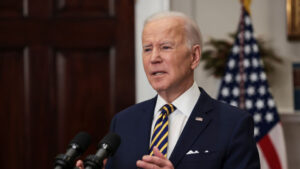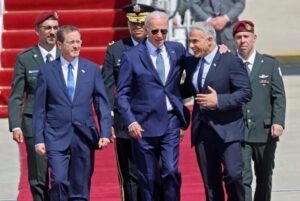By Kamaruzzaman Bustamam Ahmad, Anthropologist based in Banda Aceh, Indonesia
As a “globocop,” the United States is adamant about preventing any opportunity for Palestine to become a permanent member of the UN. In the latest meeting to produce a UN resolution for Palestine’s recognition, the United States exercised its veto power to deny Palestine a significant role in the UN.
The stance of the United States government, which aims to “babysitting” Israel, will never cease. In my meeting with Acting US Ambassador Michael F. Kleine in Banda Aceh, it was affirmed that one crucial reason why America is so closely aligned with Israel is because only America can directly communicate with Israel, regardless of the situation.
Therefore, whether willingly or not, the United States must genuinely safeguard all of Israel’s interests at the international level. Despite incessant pressure regarding the genocide in Gaza, the United States continues its “babysitting” process with Israel.
Also Read: Be Careful of the Trap of Deploying Peacekeeping Forces to Gaza
The Alliance of America and Its Allies
Global intelligence and security observer George Friedman, in his two books, “The Next 100 Years: A Forecast for the 21st Century” and “The Next Decade: Empire and Republic in a Changing World,” has outlined the future role of the United States. He introduces the term American Caliphate. One of Friedman’s arguments is: The United States is only at the beginning of its power. The 21st century will be the American Century.
Therefore, when countries attempt to rival the United States, both now and in the future, they face constant pressure not to challenge America’s supremacy. Several related articles, including some with in-depth analysis, have been presented on kba13.com.
Countries directly confronting the United States and its allies are Russia and China. Russia, with its long history as the Soviet Union that collapsed in 1989, has become an enduring rival of the United States.
Also Read: The Forty-Four-Days of Glory: Azerbaijan’s Struggle for Justice and Peace
Currently, the conflict between these two nations falls into the category of shadow wars, sometimes employing Proxy War models. Russia has a fairly good relationship with China. The latter has expanded its global influence through economic policy, preferring investment over military invasion, unlike the United States.
In the midst of these countries emerges North Korea on the Korean Peninsula, an eternal adversary of South Korea. Following these nations, Iran also surfaces as a perpetual rival of Israel, refusing to submit to the power of the United States and its allies.
The outlined mapping becomes a primary front for geopolitical and geo-economic rivalry against the United States. Here, America builds strategic diplomatic relations with neighboring countries that pose threats compared to those mentioned above. In Eastern Europe, along with NATO, the United States aims to restrict every policy direction of Putin, who increasingly portrays Russia as a key player on the continent. In South Asia, India strives to align more with America than Americans themselves.
In the Middle East, except for Iran and Yemen, Turkey in certain respects, all these countries are already under America’s “embrace,” closely guarded for their long-term interests by the Israeli government. Meanwhile, in East Asia, South Korea and Japan serve as strategic partners for the United States, genuinely interested in maintaining stability in the region while monitoring any Chinese efforts to threaten Taiwan and, in some cases, Hong Kong.
Also Read: Palestine Solidarity Month: A Collective Movement for Al-Aqsa and Palestine’s Freedom
In Southeast Asia, Singapore and Australia, part of the “Five Eyes,” safeguard this region against Chinese influence in the South China Sea and, in certain instances, monitor developments in Indonesia, the country with the largest Muslim population globally.
Thus, from the brief mapping above, there is no doubt that Palestine has become a focal point of Islamic sentiment fueled by Israel, where the United States provides the ammunition to fuel this conflict until its resolution.
From Proxy War to Nuclear War?
During the Cold War, the United States had just concluded World War II. Proxy Wars then became a trend for conquering nations. Instead of deploying troops, countries funded and trained armed civilian groups to implement the sponsoring nation’s policies. This trend continues today, including what is happening in Gaza.
Also Read: Hassan al-Turabi: A Controversial Thinker from Sudan
Whether acknowledged or not, almost all countries considered eternal enemies of the United States face economic sanctions from the UN or directly from the United States and its allies. These nations must collaborate covertly to build their economies. Occasionally, diplomatic relations are severed to enhance dramatic plots, facilitating economic sanction smoothing.
However, when Proxy Wars cease to be effective, nuclear war becomes a highly plausible option. Currently, several countries possess nuclear weapons, including the United States, the UK, France, China, Israel, North Korea, and others suspected of developing nuclear capabilities like Russia and Iran.
If open war between the United States and North Korea hasn’t occurred yet, one reason may be the strong suspicion that North Korea, if provoked, could reach American states with its nuclear weapons.
Therefore, if nuclear war truly becomes the last resort for delayed war desires, it’s plausible that several regions of the world may experience global upheaval.
Also Read: Who Exactly is the RSF Group Shaking Sudan?
The United States always opts for the “big stick” rather than the “carrot” approach towards nations threatening it in the Middle East. Similarly, it would react similarly in the South China Sea if China aggresses against Taiwan. Russia would do the same if NATO jointly threatened them. Thus, the global map could change entirely if such a nuclear war were to occur.
What’s the Connection with Israel?
Israel stands as the key to everlasting peace in the Middle East. As a nation under constant threat 24/7, Israel relentlessly pursues Palestinians wherever they may be, both domestically and abroad.
In this context, Mossad continues to pursue Palestinian diaspora, Hamas, Ikhwanul Muslim, and various ideological networks worldwide. As long as they haven’t completely eradicated Palestinian descendants, within or outside Palestine, Israel remains vigilant.
Also Read: The Two-State Solution (Palestine–Israel) in Historical Perspective
If Israel is vigilant, America and its allies become even more alert. If Israel faces threats in the Middle East, America and its allies won’t stay idle. Similarly, eternal enemies of the United States, like Russia, remain on guard as long as America is active in Washington DC.
Therefore, achieving lasting peace in the Middle East is challenging not due to the number of abductions by Hamas or IDF, but because of deliberate efforts to intensify Israel’s brutality in the region. This is also fueled by the United States’ deliberate refusal to recognize Palestine as an independent state on their own land. (T/RE1/P2)
Mi’raj News Agency (MINA)
Also Read: Enchanted by K-Dramas, Dragged into Slander: Time for Muslims to Rise!




































 Mina Indonesia
Mina Indonesia Mina Arabic
Mina Arabic